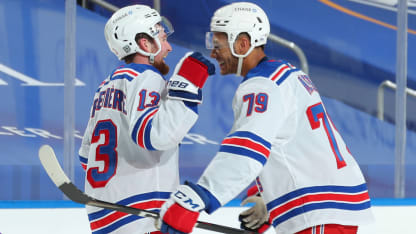That's also been the case for Anderson, who is on his second season of living with forward Blake Lizotte. The 21-year-old said it's been helpful that many of the young Kings players got to know each other through activities organized for prospects, like past development camps. Seven rookies have played at least one game for the Kings this season, tied with the Dallas Stars and New Jersey Devils for second-most in the NHL, behind the Chicago Blackhawks (eight).
"It's nice being able to go home and have a face to be able to talk to and not be completely alone throughout the day and night," said Anderson, who has four assists and is averaging 21:24 of ice time in 17 games, and has played on a defense pair with veteran Drew Doughty. "Having at least one body at the house with me, it makes days go by faster for sure."
But it's not for everyone.
Colorado Avalanche rookie defenseman Bowen Byram opted to move out of the hotel he was in at the start of the season and into a place of his own for the first time, acknowledging that even with the loneliness of the past year he was excited.
"It's kind of less things to think about," said the 19-year-old, who got to know some of his new teammates while serving as an extra player with the Avalanche during the 2020 Stanley Cup Playoffs. "It's just me, myself and I most of the time, so just being able to worry about hockey for the most part and worry about my play and getting ready to play. I think that's helped me a bit."
Byram has two assists and is averaging 18:12 of ice time in 12 games, sixth among NHL rookie defensemen who have played at least 10 games.
He has been catching up with friends during his downtime with phone calls and video game chats. He is close with Buffalo Sabres rookie forward Dylan Cozens, his co-captain with Canada at the 2020 WJC, and they talk frequently, including about what they've been going through this season.
Some young players see the pandemic and the protocols as an equalizing force. While in prior seasons they might be a step behind some of their more veteran teammates, this season that's not necessarily the case.
"We're all going through it together on the off-ice [protocols] for the first time," Foudy said.
In some ways, that levels the playing field.
But there are some things that these rookies miss experiencing.
The roar of the crowd when they score their first NHL goal? Friends and family in the stands for their debuts? Not this season. Most have made their peace with the disappointments, preferring to think about all they're gaining.
"I was still super excited, for sure," said Cozens, who made his NHL debut Jan. 14 and scored his first goal Jan. 22 against the Washington Capitals. He has scored three points (two goals, one assist) in 11 games.
"The only thing I would have rather had was probably my family in the building. But other than that, like, a goal is a goal. It's in the NHL, whether there's fans or not. It's still in the league I've dreamed of playing in my whole life."


















